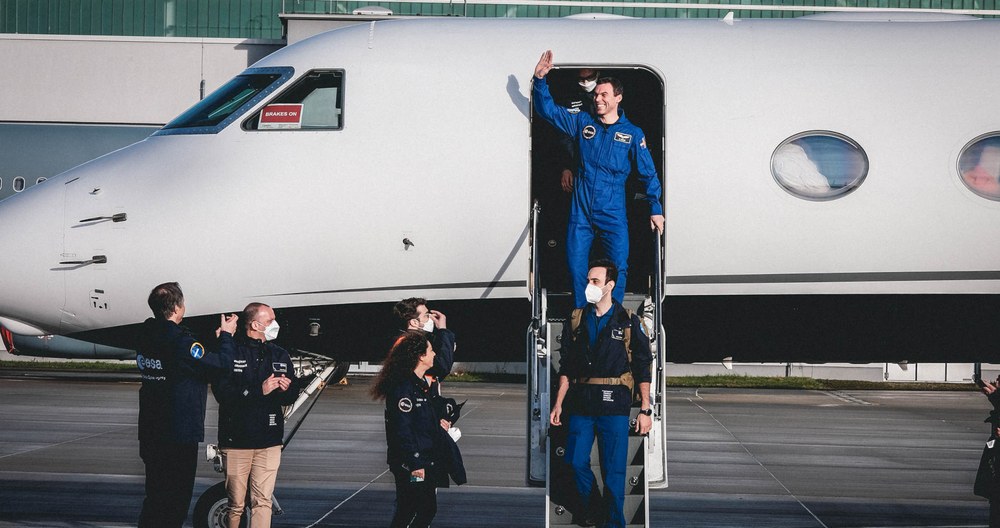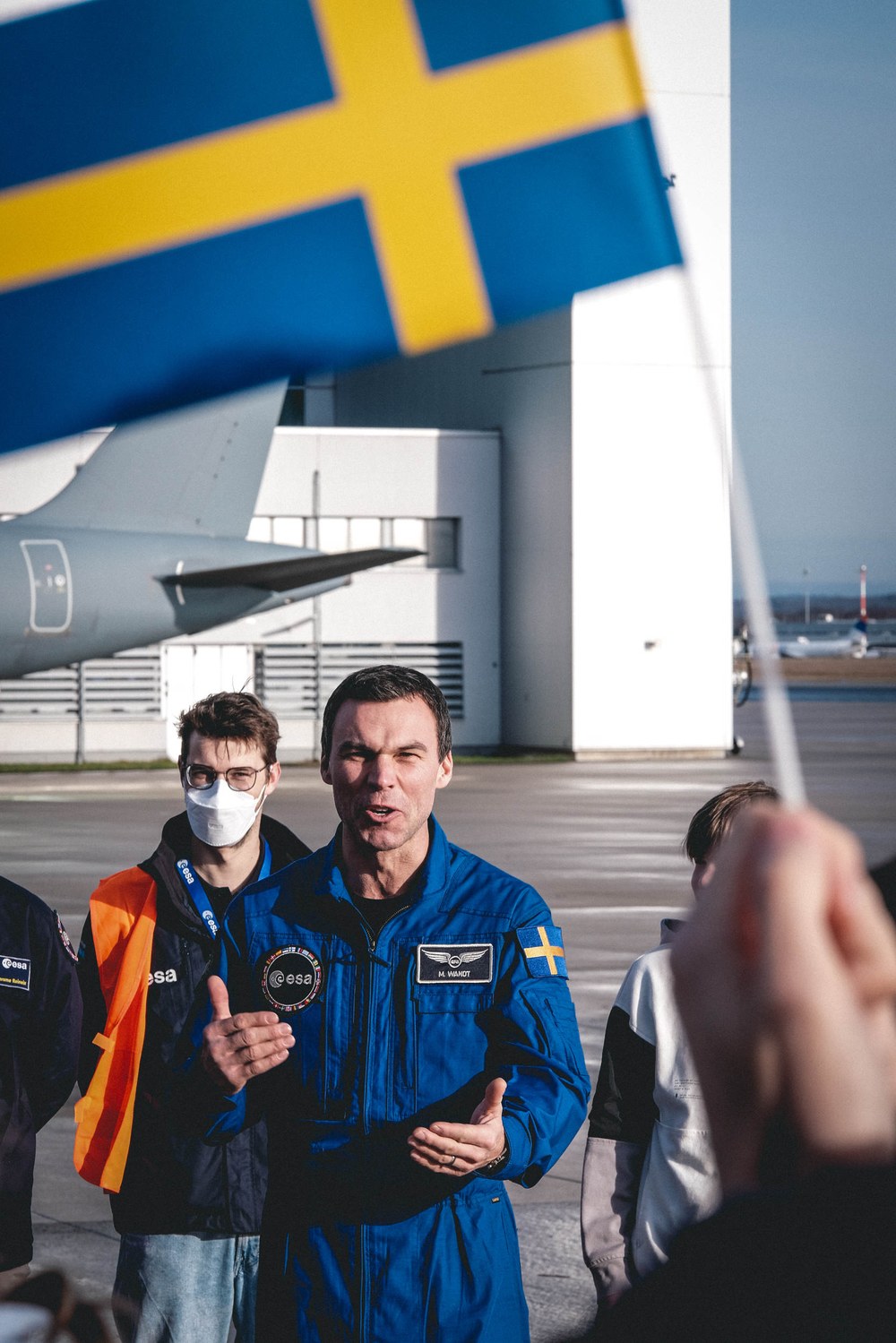Interview with ESA astronaut Marcus Wandt part II


On 9 February 2024, the Swedish ESA astronaut Marcus Wandt returned to Earth after spending 21 days on the International Space Station ISS. As for all European astronauts, his first stop was at DLR's Institute of Aerospace Medicine in Cologne. Before his flight, Wandt spoke briefly about his expectations. Here he tells us about his experience in space.
Your mission to the ISS was named after one of Odin's ravens, Muninn, which means 'memory'. What are your most memorable impressions?
Marcus Wandt: There are a few – actually, there are thousands – but some of the strongest memories are the accumulation of speed and the feeling of acceleration during the launch. That was fantastic. Having a fighter pilot background, being used to the acceleration when you throttle up and now you feel it so much stronger and for such a long time, gave me a sense of speed that I wasn't expecting. I did not expect my brain to feel how much speed we were building. It was fantastic!
When we docked to the station, heard the knock on the hatch, then looked through the window of the Dragon capsule and saw people on the other side, in space. That is an absolutely strong memory. I can still see their faces.
Then getting on board and saying hello to everyone. One evening, I was floating over to the Cupola and looking down, seeing Earth, the city lights and Earth's glow. We also saw an aurora borealis and watched two crew members return to Earth. That was also a very strong memory.
And of course, the re-entry. The feeling of vibration and the sounds. You look out the window and see the flames, the plasma around the capsule and feel the G-forces. 0.9 G feels like 5 G when you have just been in microgravity. Looking out of the windows – before they were all burnt up – and seeing how fast Earth is passing by and understanding the speed at which we were travelling – it was just crazy!
That must have been scary, too.
Marcus Wandt: No, it was strong in a positive way. No, it was pure fun. It was great! I couldn’t stop smiling and laughing, thinking "this is so awesome". It was fantastic!
Before your flight to the ISS, we talked about the negative effects of microgravity on the human body. What were your experiences like?
Marcus Wandt: The fluid shift, for instance, when you feel a bit congested and of course you can get nauseous when you reach microgravity. But I think the training prepared me so well for the 'bad' things that could come, that I felt pretty comfortable. It was weird, a lot of feelings were strange, and I had to teach my brain – or maybe it does it by itself? – how much strength I needed to use, or how do I hold on to things and stabilise myself? But I guess I was prepared for a lot of unpleasant feelings, so I never really had them. Maybe I was just so fascinated by how it felt and how it was that I was preoccupied with just observing that.
It was stressful for the body. I can tell because I slept very well for the first two nights. And I didn’t feel tired because of work or staying up late. I guess my body was just telling me "this is strange, I need a rest!".
You carried out many experiments in the Columbus laboratory. Can you give us a few examples?
Marcus Wandt: Experiment-wise, we controlled robots on Earth in the Surface Avatar experiment. In 'Orbital Architecture', I did a cognitive assessment of my relative performance, depending on where I was – in the Columbus Module, or at other locations on the station. There was also Anita-2, in which we made an assessment of the air quality in different places of the Space Station. Columbus was also where I did the blood draws for the assessments of bone health, for instance. It was a mix of different experiments.
You returned from space approximately five days ago. Did it take long to adapt to life on Earth again?
Marcus Wandt: Long is relative. To me it felt fast. Coming back was almost as strange as going up. Because I didn't have those feelings, like the effect on the balance, or the feeling of being leaden-limbed. The first morning after I returned, I was trying to get out of bed and thought "what is going on?". I just felt very heavy, even though I had lost weight. It felt strange, but also again very fascinating and fun to be honest.
But the recovery has been very fast – I think today it is the fifth day – and every day I feel a little better. Actually, in the last two days all I've had is some training soreness in my muscles, because they had to be used again. Balance-wise it feels like everything is back to normal. A quick recovery – that is what I feel.
Since your return, you have been staying at the DLR Institute for Aerospace Medicine. What kind of medical programme have you been undergoing since then?
Marcus Wandt: We are doing a lot of baseline data collection, in which we look at the science part, get data on how my bone mass has been affected and how my brain has changed. We have done a scan of that as well. We are also checking my cardiovascular system, seeing what has happened and collecting data from that. Then we are also comparing the assessments I made pre-flight, in order to check if I was healthy enough to go to space, making sure that this is still true.
We are doing recovery training, in which I do exercises mostly for the cardiovascular system, but also for the smaller muscles. The larger muscles seem to be fairly alright, the others feel good too, but I think we have to reactivate them, to make sure my core and stabilisation are fine. While in orbit, you use the larger muscles to manoeuvre, but you don't need them to stabilise yourself, you just float around, so they are not really used for stabilisation. That's why it is important to re-address them gradually, to make sure I have a strong core, before building up the other muscles.
What is next? What are you looking forward to now that you are back on Earth?
Marcus Wandt: We are going to continue this programme here for the rest of the week. After a short trip to Sweden, I will come back here to do more data collection. And then it's over to the US for a de-briefing with NASA, SpaceX, Axiom and all the entities in the US. After that, I will return here and continue with the de-briefings.
